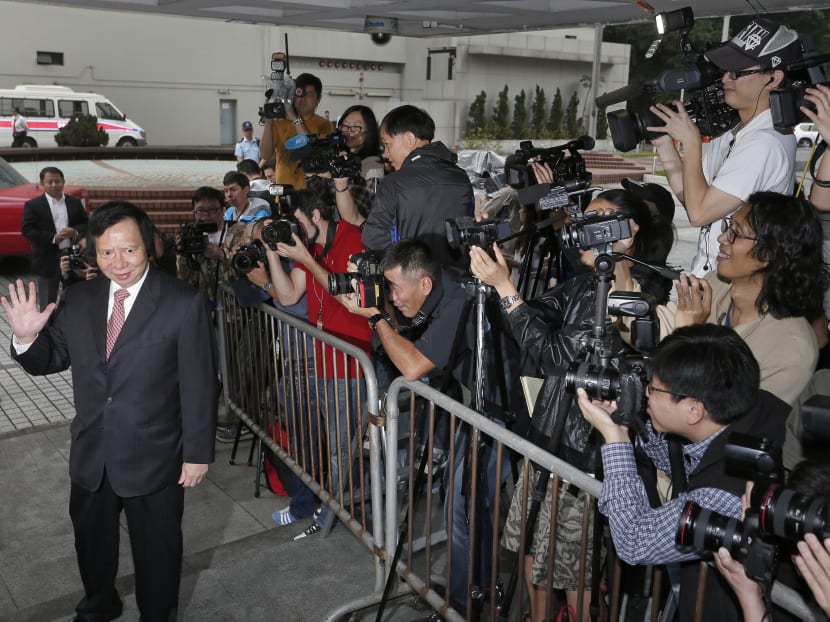How a small team of graft-busters tightened the net in Hong Kong’s most explosive corruption case
HONG KONG — Over 120 witnesses, 230 bank accounts, local and overseas, and thousands of bank transactions spanning almost a decade: such was the task facing anti-graft officers during a six-year investigation that eventually put Hong Kong’s former No 2 official Rafael Hui Si-yan behind bars.

Thomas Kwok, co-chairman of Hong Kong developer Sun Hung Kai Properties, arriving at the High Court in Hong Kong. AP file photo
HONG KONG — Over 120 witnesses, 230 bank accounts, local and overseas, and thousands of bank transactions spanning almost a decade: such was the task facing anti-graft officers during a six-year investigation that eventually put Hong Kong’s former No 2 official Rafael Hui Si-yan behind bars.
But what turned out to be the longest investigation by the Independent Commission Against Corruption since the city’s return to Chinese rule in 1997 started out with a team of just three.
“This investigation, originating from a complaint, involved accusations against a former senior government official and high-ranking staff from a big land developer. So it entailed very sensitive materials,” chief investigator Hazel Law Pui-man said.
The watchdog had to keep the team small, another investigator, Ricky Yu Chun-cheong, recalled, so things could be kept under the radar to avoid alerting the suspects.
“If you want the ICAC to function properly, confidentiality is one of key requirements that has to be upheld,” the director of investigation (government sector) said.
Mr Yu now wants the ICAC to be given more power to investigate such misconduct by top officials.
Hui, the former chief secretary, and tycoon Thomas Kwok Ping-kwong, former joint chairman of Sun Hung Kai Properties, were jailed for 7.5 and five years, respectively, in 2014 after a 131-day High Court trial.
Middlemen Thomas Chan Kui-yuen, an SHKP aid, and Francis Kwan, a stock exchange official, were sentenced to six and five years in jail, respectively.
Hui took tens of millions of dollars to be the developer’s “eyes and ears” in the government. The case drew to a close in June when the Court of Final Appeal rejected their appeals.
Looking back, Mr Yu recalled it all started with an anonymous letter sent via a lawyer in 2008 to tip them off about a corrupt deal involving an SHKP-owned flat in Leighton Hill being offered rent-free to Hui between 2003 and 2004.
It was hard to tell at the time whether the claim, described by Mr Yu as “ambiguous”, could be substantiated or not. “It has fallen into my hands. Let’s take a wider and deeper look,” he thought.
But they soon hit a wall. While being interviewed a year later, both Hui and Kwok seemed to offer reasonable explanations for the deal, Yu recalled. They said the flat was part of a consultancy fee paid to Hui, who worked for SKHP before taking public office. At that time, the officers did not have anything to rebut the claim.
“But we really wanted to find out whether what they said supported events, so we kept on digging,” Ms Law said.
They turned to Hui’s tax records and bank statements to zero in on the money flow. And the deeper the officers dug, the more unidentified remittances they found in Hui’s accounts at the end of 2011.
That was also the year, Mr Yu recalled, that he searched the home of Hui, who, as revealed during the 2014 trial, boasted a refined taste for exclusive wine, overseas operas and classical music.
“That certainly opened my eyes,” he said, of the visit. Hui has since been declared bankrupt.
Traces of Thomas Chan and Kwan began to emerge in 2012 as the investigation picked up momentum. They were arrested on March 19 that year. Ten days later, Hui and Kwok were nabbed.
There and then, the size of the team began to grow rapidly. More than 20 ICAC officers were assigned at various stages.
All their work – which included seeking overseas bank records, getting around top lawyers hired by the various parties, and coming up with the charge of conspiracy to misconduct in public office, a first in Hong Kong – culminated in the High Court drama in 2014.
Despite all the preparation, however, it was not part of the script when Hui dropped the name of an influential former mainland Chinese when he testified. Hui suggested that one of the payments he was accused of receiving might have come legitimately from Liao Hui, former director of the Hong Kong and Macau Affairs Office.
But Mr Yu said the ICAC played it cool because Hui’s suggestion was too implausible for them to call Liao to come to the court.
Summing up, he said: “The key message we would like to raise is that [the case] demonstrates our spirit of the rule of law and core value of being a clean society. This is the most important aspect of all.” SOUTH CHINA MORNING POST





